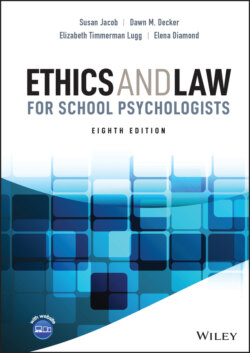Читать книгу Ethics and Law for School Psychologists - Susan Jacob - Страница 57
Discussion
ОглавлениеTanya Howard, a newly hired school psychologist, was upset by a meeting she had with the parents of a child with a disability and the director of special education. The parents were concerned because their son was being called “retard,” “monkey brains,” and other names at school, and he no longer wanted to get on the school bus in the morning. The special educator director’s only response was that “kids will be kids” and “a school can’t be expected to stop kids from teasing kids.” The boy’s parents, from India, silently accepted these statements. Because of the special education director’s overbearing manner, Tanya could not find an opportunity to speak up and express her concern about the bullying or to explore ways to address the problem. That evening, at home and using her own computer, Tanya vented her anger and frustration on Facebook. She did not use any real names, but in a post to her Facebook friends she described “the special education director” as “a bully and an arrogant creep” who “doesn’t really give a crap about kids.” She also wrote: “Parents from other countries need to learn to speak up for their children’s rights like American parents do.”
Using the NASP’s code of ethics as a guide (Appendix A), what are the ethical issues associated with Tanya’s Facebook post? Should practitioners who use social media expect their posts to be private and confidential?
